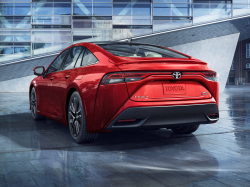— A Toyota Mirai lawsuit in California claims car owners have been ripped off the past 10 years by a conspiracy involving Toyota, its dealerships and its credit division.
The class action lawsuit argues Toyota should pay a minimum of $5.7 billion for the damage caused to California customers.
The Toyota Mirai class action lawsuit includes:
"All persons in California who purchased or leased a Toyota Mirai (Model Years 2016-2025) within four years preceding this complaint's filing."
A big point of the Mirai class action is how Toyota is the company that created the infrastructure regarding the use of hydrogen fuel in California vehicles.
The hydrogen Mirai cars are available in California only, and the class action alleges this allows Toyota to "absorb individual disasters and mask the issues with a lack of documentation, confidential settlement agreements, and financial coercion without larger scale consequences."
Calling it a "decade-long fraud by Toyota," the lawsuit claims Toyota knows the hydrogen-powered electric Mirai cars are defective and dangerous. The class action also calls the conspiracy a criminal enterprise that "ingeniously conceal catastrophic safety defects, so their fraudulent scheme remains undetected."
The three plaintiffs who sued contend Toyota dealers have admitted the Mirai cars are ticking hydrogen bombs which should not be driven. The owners also assert dealer technicians advise the best course of action is to contact a lawyer to sue Toyota.
According to the class action, Toyota and its entities know the Mirai cars leak hydrogen gas, experience propulsion problems, and cannot be reliably refueled with hydrogen.
The lawsuit even claims the cars suffer from "brake-accelerator confusion," as alleged by a Mirai driver who claims she pushed the brake pedal which caused forward acceleration. The driver complains she suffered a spinal injury caused by the alleged brake-accelerator confusion.
Mirai drivers complain about pushing the accelerator pedals, sometimes to the floors, just for nothing to happen until propulsion returns.
"In several instances, drivers are stuck in a lane with cars approaching, while pressing the accelerator as hard as they can with no response, and only after several seconds will the car regain power and surge." — Toyota Mirai class action lawsuit
And there are the purported problems with trying to refuel with hydrogen fuel. Toyota Mirai owners complain they cannot find working hydrogen refueling stations, with some drivers complaining they had to park their cars for weeks because they could not find hydrogen fuel.
According to the plaintiffs, Toyota advertised how drivers could refuel their cars in five minutes, something supposedly impossible when the hydrogen stations are usually down and out. According to the Mirai class action lawsuit, hydrogen fuel station reliability is a fantasy.
There is also an apparent problem with the hydrogen fuel which can become contaminated and destroy the cars. The class action contends just one hydrogen refueling station at 190th Street and Prairie Avenue in Torrance left at least 75 Mirai cars permanently inoperable.
In claiming Toyota violates the Racketeer Influenced and Corrupt Organizations (RICO) Act, the plaintiffs accuse the automaker of mail fraud and wire fraud over the course of years. Toyota allegedly committed fraud in their "scheme to defraud consumers through the sale of defective vehicles."
The Toyota Mirai class action lawsuit was filed by these California owners:
- Aminah Kamran / 2021 Toyota Mirai
- Deborah Alvarez / 2022 Toyota Mirai
- Dennis Eaton / 2019 Toyota Mirai (From California but now residing in Utah)
The Toyota Mirai class action lawsuit was filed in the U.S. District Court for the Central District of California: Aminah Kamran, et al., v. Toyota Motor Corporation, et al.
The plaintiffs are represented by Ingber Law Group.

